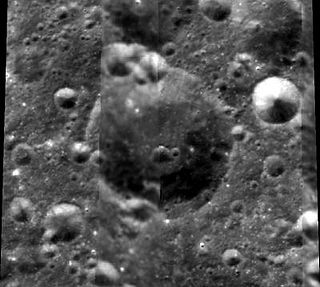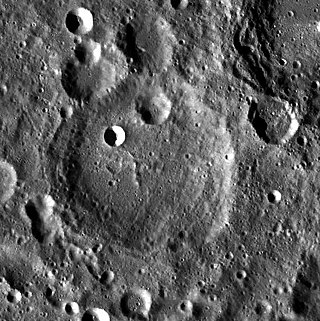
Al-Marrakushi is a small, relatively isolated lunar impact crater in the eastern Mare Fecunditatis. It is a circular, symmetrical formation, with inner walls that slope down to the midpoint. To the northeast is the prominent crater Langrenus. The mare near Al-Marrakushi is marked by ray material from its larger neighbor.

Crile is a tiny lunar impact crater. It is roughly circular and cup-shaped, with interior walls that slope down to the midpoint. The crater lies in the Palus Somni, between the Mare Crisium to the east and Mare Tranquillitatis to the west.

Ansgarius is a lunar impact crater that is located near the eastern limb of the Moon. When viewed from the Earth, the crater has a highly oval shape due to foreshortening, but the rim is actually nearly circular. To the northwest of Ansgarius is the crater La Pérouse, and south is Behaim.

Boss is a lunar impact crater that is located along the northeast rim of the Moon's near side. Due to its location, the crater is viewed from the side by observers on the Earth, and its visibility is subject to libration effects. It was named by the IAU in 1964 for astronomer Lewis Boss.

Beals is a lunar impact crater that is located near the eastern limb of the Moon, and lies across the southwestern rim of the crater Riemann. From the Earth the crater is viewed nearly from on edge, and is best seen during favorable librations. To the west is the large walled plain Gauss.

Becquerel is a lunar impact crater that lies in the northern hemisphere on the far side of the Moon. This is an ancient and heavily worn formation that is now little more than an irregular buri in the surface. The outer rim has been worn and reshaped until it forms a rugged, mountainous region around the flatter interior.

Bragg is an ancient lunar impact crater that is located on the far side of the Moon, just beyond the northwest limb. This formation has been heavily eroded and reshaped by subsequent impacts, leaving an irregular depression in the surface. The most intact portion of the rim is along the western face, while the northern and eastern rim has been nearly worn away and is overlaid by several smaller craters. The most notable of these is Bragg H, which lies across the east-southeastern rim.

Cepheus is a lunar impact crater that is located in the northeastern part of the Moon, within one crater diameter of the larger crater Franklin to the southeast. To the north-north-east is the flooded crater Oersted. The proximity of this formation to the lunar limb means it appears oblong when viewed from the Earth due to foreshortening.

Fabry is a large lunar impact crater of the form termed a walled plain. It is located on the far side of the Moon, just beyond the northeastern limb. Parts of this area are sometimes brought into view by the effects of libration, but the terrain is seen from the edge and so not much in the way of detail can be observed.

Barkla is a lunar impact crater that lies near the eastern limb of the Moon. It is located to the east of the prominent crater Langrenus, and was formerly designated Langrenus A before being renamed by the IAU in 1979. Due east of Barkla is Kapteyn, a formation only slightly larger with a similar size. Southwest of Barkla is the crater Lamé.

Brunner is a lunar impact crater that is located along the eastern limb of the Moon, to the southeast of the Mare Smythii. At this location the crater is viewed from the edge, and so it is not possible to see much detail from the Earth. The visibility of this formation is also affected by libration. The crater lies to the southwest of the walled plain Hirayama, and to the east of the elongated crater Houtermans.

Cusanus is a lunar impact crater that is located near the northeastern limb of the Moon. In this location the crater appears very foreshortened when observed from the Earth, and its visibility is affected by libration. The northern rim of Cusanus is nearly joined to the south-southeastern rim of the larger crater Petermann. To the west is Baillaud and to the southeast is Hayn.

Cori is a lunar impact crater that is located in the southern hemisphere on the far side of the Moon. It lies less than one crater diameter to the north of the crater Baldet. To the northeast is the crater Grissom. It is named after Gerty Cori, the first American woman to win the Nobel Prize and the first woman to win the prize in the category Nobel Prize in Physiology or Medicine.

Davisson is a lunar impact crater that is located on the far side of the Moon from the Earth. This crater lies across the eastern rim of the huge walled plain Leibnitz, and the rim and outer rampart intrudes into the interior floor of Leibnitz. To the east-northeast of Davisson is the walled plain Oppenheimer, a formation only somewhat smaller than Leibnitz.

De Moraes is a lunar impact crater that is located in the northern part of the Moon's far side. It lies to the northeast of the larger crater Bridgman, and southwest of van Rhijn.

Carnot is a large crater in the northern part of the Moon's far side. It was named after Nicolas L. S. Carnot by the IAU in 1970.

Chapman is a lunar impact crater that lies just beyond the northwest rim of the Moon, on the far side as seen from the Earth. It lies to the northeast of the crater Rynin, and southward of the large walled plain Poczobutt.

Chauvenet is a lunar impact crater that is located to the northeast of the prominent crater Tsiolkovskiy on the far side of the Moon. Less than one crater diameter to the northwest of Chauvenet is the crater Ten Bruggencate.

Stoletov is a lunar impact crater on the far side of the Moon. It is located in the northern hemisphere, less than one crater diameter to the north of Kulik. To the northwest of Stoletov is Montgolfier.

Kurchatov is a lunar impact crater that is located on the Moon's far side. It is just to the southwest of the crater Wiener, and farther to the southeast of Bridgman. A couple of crater diameters to the south of Kurchatov is the northern edge of the Mare Moscoviense.























